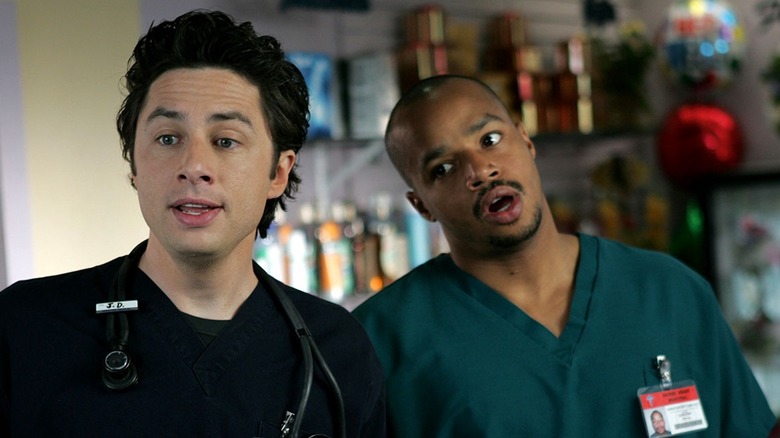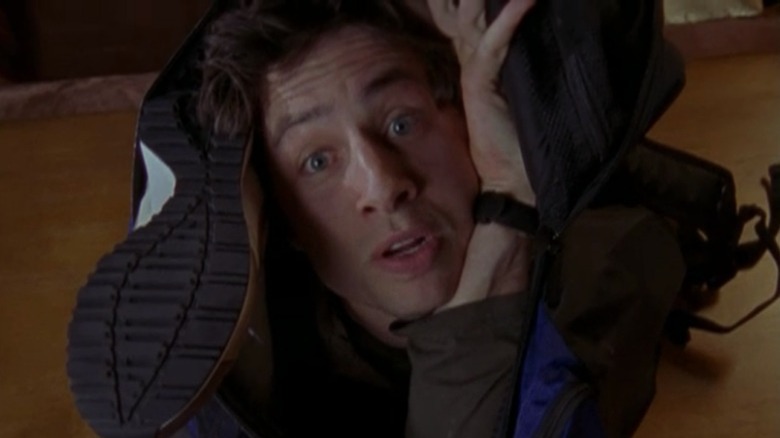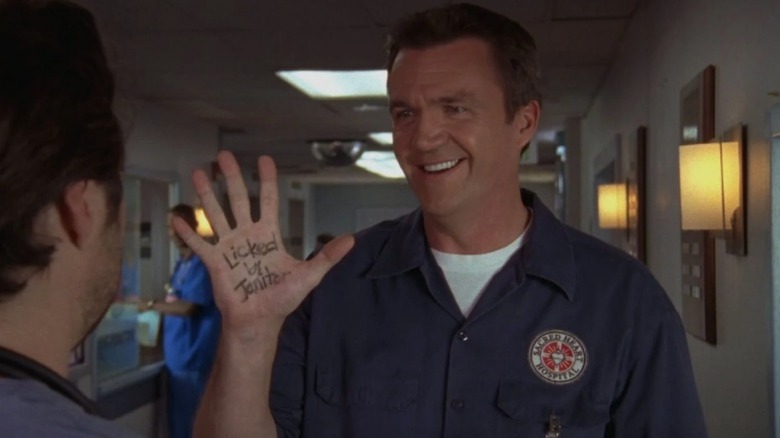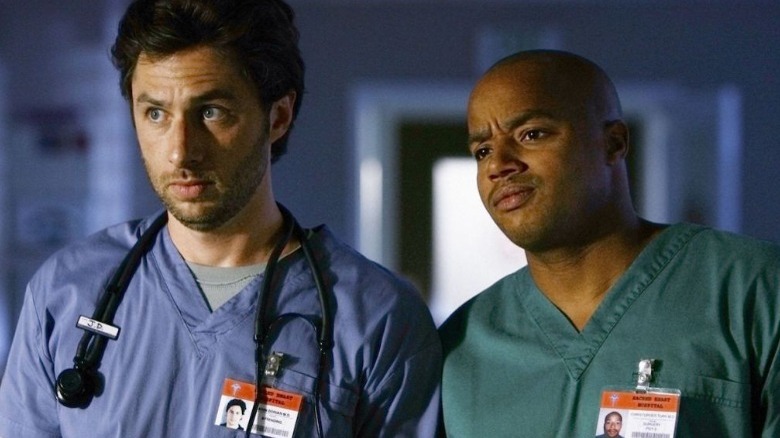Scrubs Didn't Expect To Be As Weird As It Eventually Became
For most of its nine years on television (eight regular seasons and one semi-spinoff season), "Scrubs" was off-the-wall and surreal. The show, about the journeys of medical interns to full-fledged doctors, could be as nakedly emotional and touching as the best hospital dramas. It could also be incredibly silly. Much like "Ted Lasso," another show from creator Bill Lawrence, "Scrubs" is very sincere and warm-hearted, but it embraced the bizarre with relish, especially as the seasons went on.
The key to the "Scrubs" weirdness came in its main character, J.D. (Zach Braff), who also served as narrator for the show. J.D. is neurotic, constantly wondering in voiceover about whatever plights he and the other characters might be facing. From there, the show would move into J.D.'s fantasy sequences, loaded with elaborate visual gags. Sometimes, the fantasies would speak to the episode's thematic throughline. Other times, they would just be an excuse to have the characters dress up in funny costumes, as when J.D. imagines himself as Robin to his best friend Turk's (Donald Faison) Batman. "Holy inferiority complex, Batman!"
Still, the show's reality became increasingly malleable as the show progressed, from being a heightened but surprisingly realistic portrait of the stress of healthcare work to a live-action cartoon. Even outside of J.D.'s fantasies, there would be gags like Sean (Scott Foley) growing a beard in four days because he was "a quarter Hungarian." Or J.D. being able to hide inside Turk's backpack.
Gallows humor
"Scrubs" had a basis in real life, coming directly from creator Bill Lawrence's experiences and conversations with longtime surgeon friend Jonathan Doris (J.D.). Because of that, the show was often authentic — true to the spirit of being a young person in medicine, if not to the letter. As Lawrence told the Austin Chronicle, he would see his friend "dealing with people dying and families falling apart on a day-to-day basis." That got folded into the show from the start, making it unique by virtue of its subject matter.
Being surrounded by death, J.D. and his co-workers turn to humor as a natural coping device. As Lawrence would say in the "Scrubs" reunion roundtable, the characters "laugh, they joke, they do what they can to get through stuff."
The constant air of death hanging around the hospital made for a hard sell for a sitcom, but "Scrubs" used it to its advantage. The show is often darkly comedic, as with the wildly incompetent Doug (Johnny Kastl) becoming a talented coroner because he accidentally killed so many of his patients. While the show could just as often use death for pathos and big emotional moments, its macabre sense of humor was an advantage. Death and injury could put the characters' petty arguments into perspective, but it also tended to leave absurdity and strangeness in its wake.
Odd ducks (and a Janitor)
While the show is pretty much always from the perspective of J.D., it also occasionally opens up to explore the thoughts and dramas of its supporting cast. Characters like Turk, perennial love interest Elliot (Sarah Chalke, who almost wasn't cast on the show), and occasionally over-serious nurse Carla (Judy Reyes) all get their own episodes, reflecting how much the show's writers loved their ensemble.
Beyond that group was the rest of the hospital staff. There was the aforementioned Doug, the banana hammock-wearing meathead surgeon Todd (Robert Maschio), the potentially homicidal Hooch (Phill Lewis), and an ever-increasing stable of guests that had plenty of gag-ready catchphrases and quirks. As Bill Lawrence said in the show's reunion, this was inspired by "The Simpsons," claiming that, like that show, the "Scrubs" writers "decided to kind of fill our world with all these odd ducks."
Those odd ducks were one example of the show gradually becoming more cartoonish as it went on. Early in season 1, those characters were funny, but in a more muted, subdued way than what they would eventually become. At its outset, the most bizarre character on "Scrubs" was the unnamed, menacing Janitor (Neil Flynn), who was originally designed to be a figment of J.D.'s imagination (per the show's DVD commentaries). The character slowly being brought into the show's reality demonstrates that reality's unraveling. Especially when you get into his particular schemes and gags, like his massive parking lot sandcastle, "Janitoria."
Sitcom growth
The truth is that many sitcoms change over the years, as the writers and actors learn what works and what doesn't. If the "Scrubs" writers had continued to cast the Janitor as a figment of J.D.'s imagination, the audience would never have gotten his creepy yet surprisingly sweet attempts to court Elliot. We certainly wouldn't have gotten as much of Neil Flynn's prodigious improvisations. And if Sacred Heart Hospital hadn't been filled with such a large group of wacky characters, it's very likely the show would have never hit its comedic heights.
The show's most endearing quality is in the extent to which it goes for broke, comedically. For as strong a grasp it has on romantic relationships, dealing with death, and even ethical quandaries, it was always funny above all. Even if that meant getting weird and straining the show's relationship to the real world.
As Bill Lawrence said, the audience engagement that let the show stay on the air was a big part of its development. Explaining why the show "became weird," he said that "you could stay on for a while if you kept feeding people what they're enjoying. And we pledged early on to, even if we kinda went down with the ship, to do stuff that... made us all laugh."



